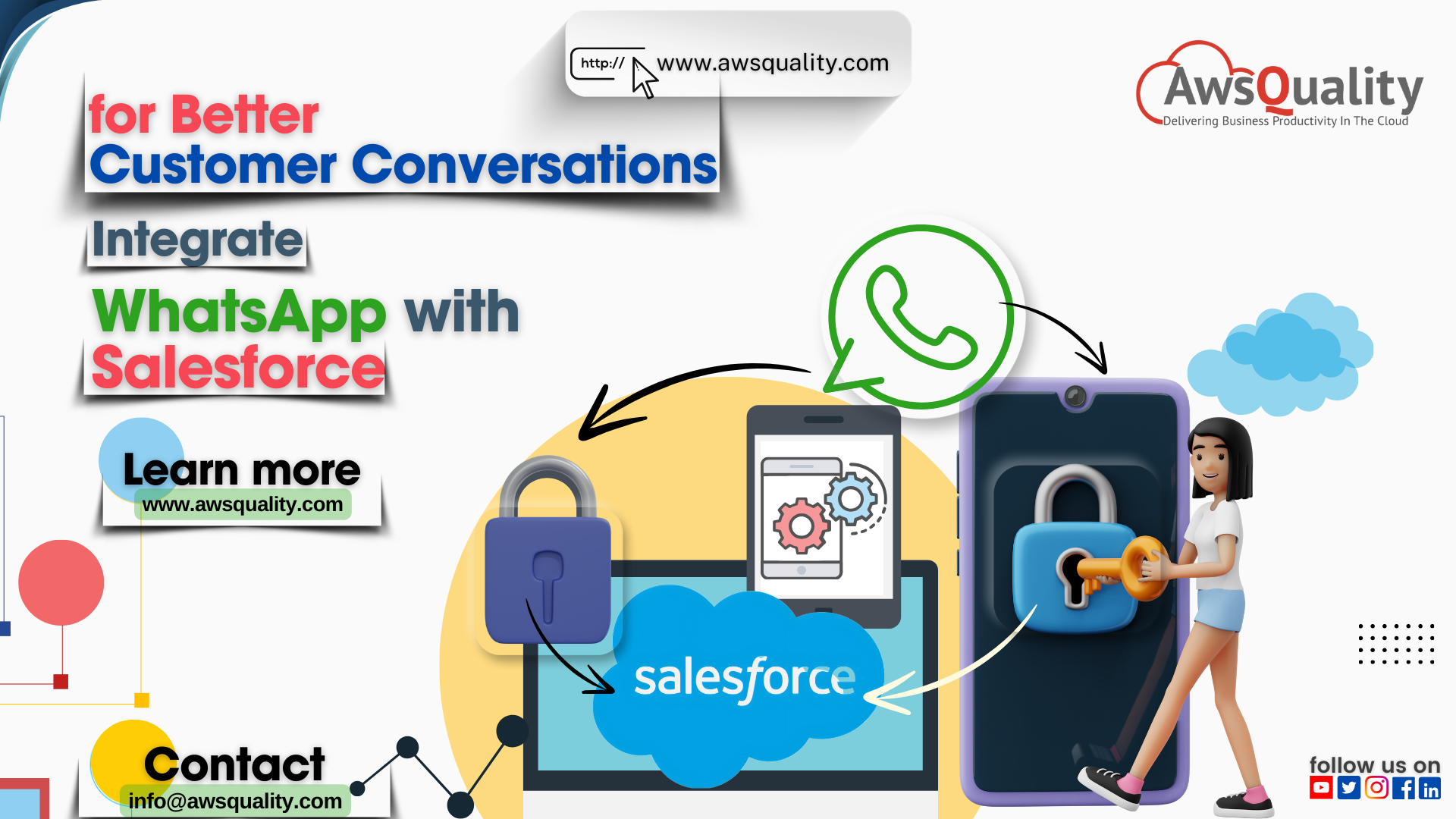
Integrating WhatsApp with Salesforce CRM enhances communication, automation, and customer insights for streamlined business operations.
Boost customer interactions by integrating WhatsApp with Salesforce CRM. Discover how to integrate WhatsApp Business API with Salesforce seamlessly and learn about Salesforce’s WhatsApp messaging capability. This article covers all the bases, from managing transactional messaging and efficient marketing to setting up automated processes and tailored communication, whether you’re a Salesforce development company or looking for sophisticated Salesforce solutions. Leverage the full potential of Salesforce CRM to improve customer interaction and streamline business processes while overcoming obstacles with technological complexity and privacy issues.
How to Integrate WhatsApp with Salesforce for Better Customer Conversations?
Integration between Salesforce and WhatsApp helps enhance and speed up client communications. Below are some methods to make this integration happen:
-
Salesforce’s WhatsApp Messaging Feature:
- Salesforce’s Spring ’20 version included native WhatsApp messaging.
- Actions:
- Establishment & Consent:
- Using Facebook Business Manager, set up a WhatsApp account.
- Connect it to your Salesforce organization.
-
Settings for Messaging:
- Make a fresh Salesforce channel.
- Choose WhatsApp as the channel and enter the necessary information (such as the phone number associated with your WhatsApp Business account).
- For data exchange, take note of the generated webhook URL.
2. Integration between WhatsApp and Salesforce:
There are two kinds of WhatsApp communication:
Customer Care Interactions:
- Consumers use WhatsApp to contact your company when they need assistance.
- Assign requests in Salesforce Service Cloud to the appropriate agents.
- Use Salesforce Einstein to program replies in advance.
Pre-Approved Notifications:
- With customers’ permission, businesses can start WhatsApp conversations on transactional content (such order status updates and payment confirmations).
- Examine various integration choices in light of your requirements.
When selecting an integration solution, don’t forget to take into account elements like SMS combination services, Salesforce native vs. connected tools, budget, and billing structure.
What advantages come with combining WhatsApp and Salesforce?
There are various advantages of integrating WhatsApp and Salesforce:
-
Improved Interaction with Customers:
- Real-time Communication: Direct, instant messaging with customers is made possible with WhatsApp.
- Personalized Interactions: Customize responses and offer help based on information from Salesforce.
-
Simplified Procedures:
- Automated Workflows: Use Salesforce workflows to set up automated notifications, answers, and routing.
- Case Management: In Salesforce Service Cloud, assign relevant agents to handle WhatsApp requests.
-
360-Degree Perspective of Clients:
- Unified Data: Merge consumer information already stored in Salesforce with WhatsApp exchanges.
- Comprehensive insights: Recognize consumer behavior over all platforms.
-
Messaging during transactions:
- Order Currents: Send order confirmations, shipment details, and payment reminders over WhatsApp.
- Reminders for Appointments: Use WhatsApp to set up and get reminders for appointments.
-
Effective Marketing and Sales:
- Lead generation, is the process of obtaining lead’s from WhatsApp discussions.
- Campaign’s: To run targeted marketing campaigns, use WhatsApp.
Remember that your unique business objectives and needs will determine how well the integration goes.
What are the barriers to integrating WhatsApp with Salesforce?
There are advantages to integrating WhatsApp and Salesforce, but there are drawbacks as well:
-
Consent and Privacy:
- User Consent: Make sure users give their express permission to receive communications from WhatsApp.
- Data privacy: Manage personal information safely and in accordance with privacy laws.
-
Technical Difficulty:
- API Integration: Technical know-how is needed to set this up.
- Callbacks and Webhooks: Handling webhooks for instantaneous communication might be difficult.
-
Formatting of Messages:
- Rich Media: It might be challenging to format messages that include buttons, graphics, or videos.
- Character Restrictions: WhatsApp message length is limited.
-
Expenses & Invoicing:
- Business API for WhatsApp: The cost of this paid service varies according to usage.
- Message Costs: Take into account the costs of sending and receiving messages.
-
Upkeep and observation:
- Channels of Surveillance: Check WhatsApp groups on a regular basis for problems.
- Updates and Maintenance: Stay informed about modifications to Salesforce functionality and WhatsApp APIs.
These difficulties can be lessened with appropriate preparation and continued supervision.
To sum up,
There are a lot of benefits to connecting WhatsApp with Salesforce in terms of improving client engagement and operational effectiveness. Businesses can get real-time, personalized communication, automated workflows, and extensive customer analytics by integrating Salesforce CRM with the WhatsApp Business API. Although there are certain obstacles to overcome, like technological difficulty, message formatting, technical complexity, data protection and privacy issues, this connection is a wise choice for any Salesforce development company in the USA, because the advantages are substantial.
Get creative Salesforce solutions and professional advice by visiting AwsQuality technologies (https://www.awsquality.com), a renowned Salesforce development firm committed to assisting you in realizing the most out of your Salesforce investments, for expert advice and cutting-edge Salesforce solutions.




